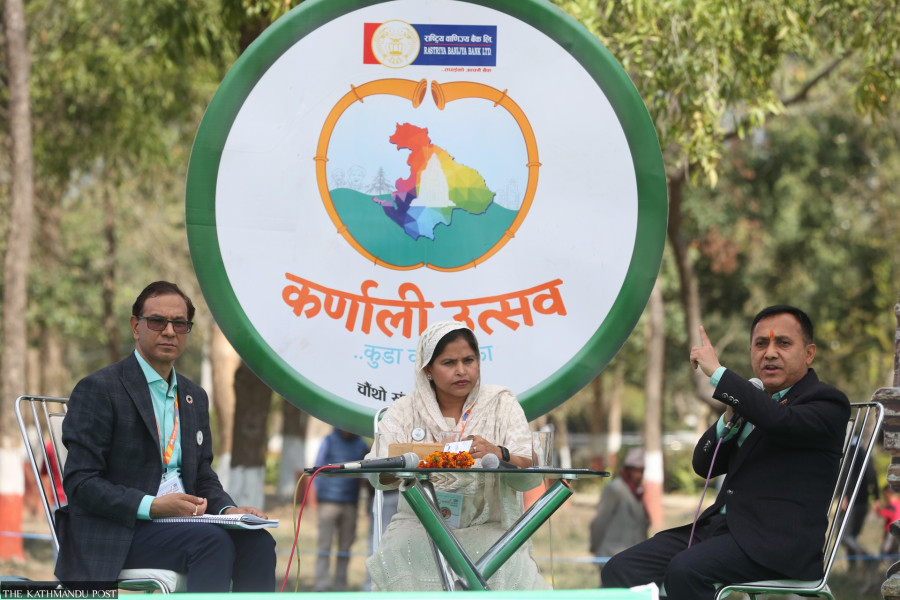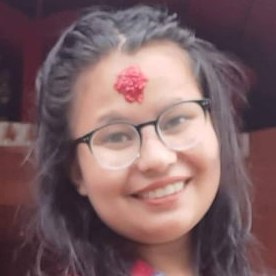Culture & Lifestyle
Discussing Karnali
Kuda Karnali started three years ago with the aim of promoting the region.
Tripti Shahi
The 4th edition of Karnali Utsav: Kuda Karnali concluded yesterday after three days of festivities. According to the organizers, the festival that was held in Birendranagar was conducted to discuss the economic, social and political condition of Karnali.
“We will listen to the issues of Karnali and discuss to find the solutions during this event,” said Kewal Prasad Bhandari, the secretary of National Planning Commission at the opening ceremony of the festival.
The Chief Minister of Karnali Raj Kumar Sharma also emphasised the importance of such discussions at the opening ceremony saying, “Discussions at programmes like these will play an important role in the overall development of Karnali.”
A total of 16 thematic discussion sessions were organised during Kuda Karnali. A session titled Karnali Chintan (Thoughts on Karnali), led by Nanda Bahadur Singh, the vice-chancellor of Mid-West Univeristy, kicked off the discussions on February 17. It was followed by Kheldo Chha Karnali (Karnali is playing) and Paikelo (heroes), Bhot-Bhet, and Sikshya Ra Samarpan (education and dedication). The day ended with a musical concert that showcased the traditional music of the region.
On the second day of the event, six different topics were discussed. The first session, Dalit-Dalil, covered Dalits and their rights. During this, Chhawilal Bishwakarma, a member of parliament, requested the state to actively invest in the socioeconomic upliftment of Dalit communities which he believes will further Karnali's development.
Urmila Bishwakarma, Karnali's Minister of State for Physical Infrastructure, spoke at the same session about the need for Dalit communities to be self-sufficient in their livelihood. Because she could not directly represent the women and Dalits of Karnali on the frontlines, she discussed how she found an alternative way of representation as a state minister.
A session on food and hunger was also featured at the festival on February 18 which focused on Karnali's association with hunger and malnutrition due to cultural factors rather than a lack of food. The festival also had discussions on radio and how the province has one of the largest number of radio consumers with 58 percent of the people there being active radio listeners. The next session covered five years of federalism. Chairman of Karnali Province of CPN Maoist Center Bimala KC said that while federalism is challenging to implement, it provides people from different communities to participate in state affairs.
In another session on the investment prospects in Karnali, the panelists discussed the need for the government to create an investment friendly environment. The last session for the day was on Karnali’s river system and the panelists talked about the need to capitalise on the immense potential of Karnali’s water resources.
The third and final day of Kuda Karnali featured five discussion sessions. The first session, Saglo Samaj Ra Sanglo Rajniti (Clean society and clean politics), featured General Minister of Nepali Congress and House of Parliament representative Bishwaprakash Sharma, who said "Politicians should sacrifice their thirst for power to avoid the detachment of the populace from Nepali politics."
In the same session, panellist and human rights activist Mohana Ansari talked about the changing face of Nepali politics. “Previously, Nepali politics revolved around inequality and discrimination. However, times are changing. The political parties should now reflect and perpetuate the sentiments of the people,” said Ansari.
During the second session on February 19, titled Rupantaran Binako Pustantaran (Transliteration without conversion), the panellists—including Sobita Gautam and Gyanendra Shahi from the National Swatantrata Party and the National Prajatantra Party, respectively—discussed how the society will not progress until people change their mindsets. “Our major agenda is the conversion of thinking toward progression," stated Gautam.
Samaweshi Sashan (Inclusive government) was another discussion topic on the final day. One of the speakers in the session, Khimlal Devkota, who is a member of the National Assembly, said, “It is due to the amendment of the law that women’s representation has decreased compared to the previous election.” This session focused the need to make laws and the government more inclusive and representative. ‘Digital Democracy’ and Karnali dekhi Kathmandu Samma were the other two thematic sessions organised on the third day of the event.
Kuda Karnali was started three years ago with the aim of promoting the Karnali state.




 9.89°C Kathmandu
9.89°C Kathmandu

.jpg&w=200&height=120)













